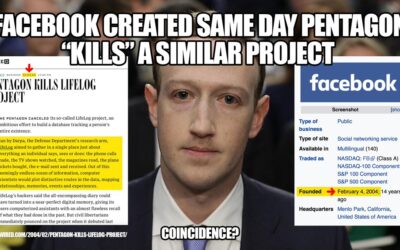Most of us don’t think much about it, but the truth is that people are being watched, tracked and monitored more today than at any other time in human history. The explosive growth of technology in recent years has given governments, spy agencies and big corporations monitoring tools that the despots and dictators of the past could only dream of.
 Previous generations never had to deal with “pre-crime” surveillance cameras that use body language to spot criminals or unmanned drones watching them from far above. Previous generations would have never even dreamed that street lights and refrigerators might be spying on them. Many of the incredibly creepy surveillance technologies that you are about to read about are likely to absolutely astound you. We are rapidly heading toward a world where there will be no such thing as privacy anymore. Big Brother is becoming all-pervasive, and thousands of new technologies are currently being developed that will make it even easier to spy on you. The world is changing at a breathtaking pace, and a lot of the changes are definitely not for the better.
Previous generations never had to deal with “pre-crime” surveillance cameras that use body language to spot criminals or unmanned drones watching them from far above. Previous generations would have never even dreamed that street lights and refrigerators might be spying on them. Many of the incredibly creepy surveillance technologies that you are about to read about are likely to absolutely astound you. We are rapidly heading toward a world where there will be no such thing as privacy anymore. Big Brother is becoming all-pervasive, and thousands of new technologies are currently being developed that will make it even easier to spy on you. The world is changing at a breathtaking pace, and a lot of the changes are definitely not for the better.
The following are 14 incredibly creepy surveillance technologies that Big Brother will be using to watch you….
#1 “Pre-Crime” Surveillance Cameras
A company known as BRS Labs has developed “pre-crime” surveillance cameras that can supposedly determine if you are a terrorist or a criminal even before you commit a crime.
Does that sound insane?
Well, authorities are taking this technology quite seriously. In fact, dozens of these cameras are being installed at major transportation hubs in San Francisco….
In its latest project BRS Labs is to install its devices on the transport system in San Francisco, which includes buses, trams and subways.
The company says will put them in 12 stations with up to 22 cameras in each, bringing the total number to 288.
The cameras will be able to track up to 150 people at a time in real time and will gradually build up a ‘memory’ of suspicious behaviour to work out what is suspicious.
#2 Capturing Fingerprints From 20 Feet Away
Can you imagine someone reading your fingerprints from 20 feet away without you ever knowing it?
This kind of technology is actually already here according to POPSCI….
Gaining access to your gym or office building could soon be as simple as waving a hand at the front door. A Hunsville, Ala.-based company called IDair is developing a system that can scan and identify a fingerprint from nearly 20 feet away. Coupled with other biometrics, it could soon allow security systems to grant or deny access from a distance, without requiring users to stop and scan a fingerprint, swipe an ID card, or otherwise lose a moment dealing with technology.
Currently IDair’s primary customer is the military, but the startup wants to open up commercially to any business or enterprise that wants to put a layer of security between its facilities and the larger world. A gym chain is already beta testing the system (no more using your roommate’s gym ID to get in a free workout), and IDair’s founder says that at some point his technology could enable purchases to be made biometrically, using fingerprints and irises as unique identifiers rather than credit card numbers and data embedded in magnetic strips or RFID chips.
#3 Mobile Backscatter Vans
Police all over America will soon be driving around in unmarked vans looking inside your cars and even under your clothes using the same “pornoscanner” technology currently being utilized by the TSA at U.S. airports….
American cops are set to join the US military in deploying American Science & Engineering’s Z Backscatter Vans, or mobile backscatter radiation x-rays. These are what TSA officials call “the amazing radioactive genital viewer,” now seen in airports around America, ionizing the private parts of children, the elderly, and you (yes you).
These pornoscannerwagons will look like regular anonymous vans, and will cruise America’s streets, indiscriminately peering through the cars (and clothes) of anyone in range of its mighty isotope-cannon. But don’t worry, it’s not a violation of privacy. As AS&E’s vice president of marketing Joe Reiss sez, “From a privacy standpoint, I’m hard-pressed to see what the concern or objection could be.”
You can see a YouTube video presentation about this new technology right here.
#4 Hijacking Your Mind
The U.S. military literally wants to be able to hijack your mind. The theory is that this would enable U.S. forces to non-violently convince terrorists not to be terrorists anymore. But obviously the potential for abuse with this kind of technology is extraordinary. The following is from a recent article by Dick Pelletier….
The Pentagon’s Defense Advanced Research Projects Agency (DARPA) wants to understand the science behind what makes people violent, and then find ways to hijack their minds by implanting false, but believable stories in their brains, with hopes of evoking peaceful thoughts: We’re friends, not enemies.
Critics say this raises ethical issues such as those addressed in the 1971 sci-fi movie, A Clockwork Orange, which attempted to change people’s minds so that they didn’t want to kill anymore.
Advocates, however, believe that placing new plausible narratives directly into the minds of radicals, insurgents, and terrorists, could transform enemies into kinder, gentler citizens, craving friendship.
Scientists have known for some time that narratives; an account of a sequence of events that are usually in chronological order; hold powerful sway over the human mind, shaping a person’s notion of groups and identities; even inspiring them to commit violence. See DARPA proposal request HERE.
#5 Unmanned Drones In U.S. Airspace
Law enforcement agencies all over the United States are starting to use unmanned drones to spy on us, and the Department of Homeland Security is aggressively seeking to expand the use of such drones by local authorities….
The Department of Homeland Security has launched a program to “facilitate and accelerate the adoption” of small, unmanned drones by police and other public safety agencies, an effort that an agency official admitted faces “a very big hurdle having to do with privacy.”
The $4 million Air-based Technologies Program, which will test and evaluate small, unmanned aircraft systems, is designed to be a “middleman” between drone manufacturers and first-responder agencies “before they jump into the pool,” said John Appleby, a manager in the DHS Science and Technology Directorate’s division of borders and maritime security.
The fact that very few Americans seem concerned about this development says a lot about where we are as a nation. The EPA is already using drones to spy on cattle ranchers in Nebraska and Iowa. Will we eventually get to a point where we all just consider it to be “normal” to have surveillance drones flying above our heads constantly?
#6 Law Enforcement Using Your Own Cell Phone To Spy On You
Although this is not new technology, law enforcement authorities are using our own cell phones to spy on us more extensively than ever before as a recent Wired article described….
Mobile carriers responded to a staggering 1.3 million law enforcement requests last year for subscriber information, including text messages and phone location data, according to data provided to Congress.
A single “request” can involve information about hundreds of customers. So ultimately the number of Americans affected by this could reach into “the tens of millions” each year….
The number of Americans affected each year by the growing use of mobile phone data by law enforcement could reach into the tens of millions, as a single request could ensnare dozens or even hundreds of people. Law enforcement has been asking for so-called “cell tower dumps” in which carriers disclose all phone numbers that connected to a given tower during a certain period of time.
So, for instance, if police wanted to try to find a person who broke a store window at an Occupy protest, it could get the phone numbers and identifying data of all protestors with mobile phones in the vicinity at the time — and use that data for other purposes.
Perhaps you should not be using your cell phone so much anyway. After all, there are more than 500 studies that show that cell phone radiation is harmful to humans.
#7 Biometric Databases
All over the globe, governments are developing massive biometric databases of their citizens. Just check out what is going on in India….
In the last two years, over 200 million Indian nationals have had their fingerprints and photographs taken and irises scanned, and given a unique 12-digit number that should identify them everywhere and to everyone.
This is only the beginning, and the goal is to do the same with the entire population (1.2 billion), so that poorer Indians can finally prove their existence and identity when needed for getting documents, getting help from the government, and opening bank and other accounts.
This immense task needs a database that can contain over 12 billion fingerprints, 1.2 billion photographs, and 2.4 billion iris scans, can be queried from diverse devices connected to the Internet, and can return accurate results in an extremely short time.
#8 RFID Microchips
In a previous article, I detailed how the U.S. military is seeking to develop technology that would enable it to monitor the health of our soldiers and improve their performance in battle using RFID microchips.
Most Americans don’t realize this, but RFID microchips are steadily becoming part of the very fabric of our lives. Many of your credit cards and debit cards contain them. Many Americans use security cards that contain RFID microchips at work. In some parts of the country it is now mandatory to inject an RFID microchip into your pet.
Now, one school system down in Texas actually plans to start using RFID microchips to track the movements of their students….
Northside Independent School District plans to track students next year on two of its campuses using technology implanted in their student identification cards in a trial that could eventually include all 112 of its schools and all of its nearly 100,000 students.
District officials said the Radio Frequency Identification System (RFID) tags would improve safety by allowing them to locate students — and count them more accurately at the beginning of the school day to help offset cuts in state funding, which is partly based on attendance.
#9 Automated License Plate Readers
In a previous article, I quoted a Washington Post piece that talked about how automated license plate readers are being used to track the movements of a vehicle from the time that it enters Washington D.C. to the time that it leaves….
More than 250 cameras in the District and its suburbs scan license plates in real time, helping police pinpoint stolen cars and fleeing killers. But the program quietly has expanded beyond what anyone had imagined even a few years ago.
With virtually no public debate, police agencies have begun storing the information from the cameras, building databases that document the travels of millions of vehicles.
Nowhere is that more prevalent than in the District, which has more than one plate-reader per square mile, the highest concentration in the nation. Police in the Washington suburbs have dozens of them as well, and local agencies plan to add many more in coming months, creating a comprehensive dragnet that will include all the approaches into the District.
#10 Face Reading Software
Can computers tell what you are thinking just by looking at your face?
Don’t laugh.
Such technology is actually being actively developed. The following is from a recent NewScientist article….
IF THE computers we stare at all day could read our faces, they would probably know us better than anyone.
That vision may not be so far off. Researchers at the Massachusetts Institute of Technology’s Media Lab are developing software that can read the feelings behind facial expressions. In some cases, the computers outperform people. The software could lead to empathetic devices and is being used to evaluate and develop better adverts.
#11 Data Mining
The government is not the only one that is spying on you. The truth is that a whole host of very large corporations are gathering every shred of information about you that they possibly can and selling that information for profit. It is called “data mining“, and it is an industry that has absolutely exploded in recent years.
One very large corporation known as Acxiom actually compiles information on more than 190 million people in the U.S. alone….
The company fits into a category called database marketing. It started in 1969 as an outfit called Demographics Inc., using phone books and other notably low-tech tools, as well as one computer, to amass information on voters and consumers for direct marketing. Almost 40 years later, Acxiom has detailed entries for more than 190 million people and 126 million households in the U.S., and about 500 million active consumers worldwide. More than 23,000 servers in Conway, just north of Little Rock, collect and analyze more than 50 trillion data ‘transactions’ a year.
#12 Street Lights Spying On Us?
Did you ever consider that street lights could be spying on you?
Well, it is actually happening. New high tech street lights that can actually watch what you do and listen to what you are saying are being installed in some major U.S. cities. The following is from a recent article by Paul Joseph Watson for Infowars.com….
Federally-funded high-tech street lights now being installed in American cities are not only set to aid the DHS in making “security announcements” and acting as talking surveillance cameras, they are also capable of “recording conversations,” bringing the potential privacy threat posed by ‘Intellistreets’ to a whole new level.
#13 Automated ISP Monitoring Of Your Internet Activity
As I have written about before, nothing you do on the Internet is private. However, Internet Service Providers and the entertainment industry are now taking Internet monitoring to a whole new level….
If you download potentially copyrighted software, videos or music, your Internet service provider (ISP) has been watching, and they’re coming for you.
Specifically, they’re coming for you on Thursday, July 12.
That’s the date when the nation’s largest ISPs will all voluntarily implement a new anti-piracy plan that will engage network operators in the largest digital spying scheme in history, and see some users’ bandwidth completely cut off until they sign an agreement saying they will not download copyrighted materials.
Word of the start date has been largely kept secret since ISPs announced their plans last June. The deal was brokered by the Recording Industry Association of America (RIAA) and the Motion Picture Association of America (MPAA), and coordinated by the Obama Administration.
Spying On Us Through Our Appliances
Could the government one day use your refrigerator to spy on you?
Don’t laugh.
That is exactly what CIA Director David Petraeus says is coming….
Petraeus says that web-connected gadgets will ‘transform’ the art of spying – allowing spies to monitor people automatically without planting bugs, breaking and entering or even donning a tuxedo to infiltrate a dinner party.
‘Transformational’ is an overused word, but I do believe it properly applies to these technologies,’ said Petraeus.
‘Particularly to their effect on clandestine tradecraft. Items of interest will be located, identified, monitored, and remotely controlled through technologies such as radio-frequency identification, sensor networks, tiny embedded servers, and energy harvesters – all connected to the next-generation internet using abundant, low-cost, and high-power computing.’
Petraeus was speaking to a venture capital firm about new technologies which aim to add processors and web connections to previously ‘dumb’ home appliances such as fridges, ovens and lighting systems.
For many more ways that Big Brother is spying on you, please see these articles….
“Every Breath You Take, Every Move You Make – 14 New Ways That The Government Is Watching You”
“30 Signs That The United States Of America Is Being Turned Into A Giant Prison”
The things that I have written about above are just the things that they admit to.
There are also many “black box technologies” being developed out there that the public does not even know about yet.
So how far will all of this go?
Has Big Brother already gone way too far?
Please feel free to post a comment with your opinion below….
Source: The American Dream



